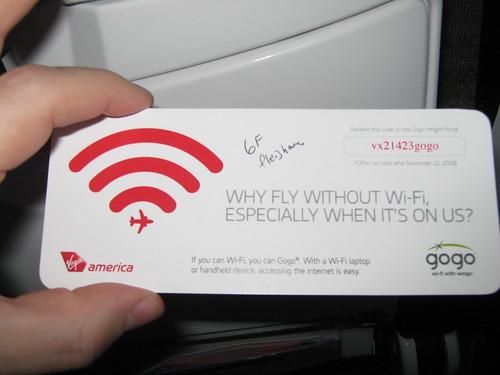Giant leap for airborne communications; US Federal Communications Commission approves operation of aeronautical mobile-satellite service in conventional Ku-band segment
(Source: Flight Global & eweek.com)
Promising the fastest Wi-Fi in the sky, Row 44’s satellite-based airline broadband service wins operating approval from the Federal Communications Commission.
In a move that could usher in a new era for airborne communications the US Federal Communications Commission (FCC) has green-lighted Row 44’s application to operate an aeronautical mobile-satellite service (AMSS) in the conventional Ku-band segment.
The award, being heralded by Row 44 as “a major victory”, comes one month after Alaska Airlines and Southwest Airlines urged the FCC to finally approve the California-based firm’s application, which had come under persistent fire from would-be rival ViaSat.
Alaska and Southwest are trialing Row 44’s high-speed broadband system on a total five Boeing 737s. Their ability to expand the service fleet-wide hinged upon the approval of Row 44’s application.
As recently as 29 July, ViaSat asked the FCC to refrain from granting authority to Row 44. But Row 44 persevered, learning this week that it had received the crucial operating license from the FCC.
The license, together with the license already granted to Row 44 in Canada and a ‘right to operate’ agreement in Mexico, allows Row 44 to provide uninterrupted airborne Internet service throughout the North American continent, and brings it ever closer to providing near global coverage.
The FCC ruling states :
With this Order, we grant blanket authority to Row 44, Inc. (Row 44) for domestic operation of up to 1,000 technically identical transmit/receive aircraft earth stations in the Aeronautical Mobile Satellite Service (AMSS). The aircraft earth stations will operate in the conventional Ku-band, transmitting in 14.05-14.47 GHz and receiving in 11.7-12.2 GHz. We also grant Row 44 a waiver of the U.S. Table of Frequency Allocations (Table of Allocations) to permit its operations in the 11.7-12.2 GHz band. These earth stations will be used to communicate via leased transponders on three geostationary satellites: Horizon 1 at 127º W.L., operated by Intelsat LLC; and AMC-2 at 101º W.L. and AMC-9 at 83º W.L., operated by SES Americom, Inc. Today’s grant will allow Row 44 to provide two-way, in-flight broadband services to passengers and flight crews aboard commercial airliners and private aircraft. We believe that implementation of Row 44’s AMSS system, pursuant to this authorization, will enhance competition in an important sector of the mobile telecommunications market in the United States.
Row 44 holds the distinction of being the first Ku-band-based connectivity service provider to operate in the commercial sector following the late 2006 demise of Connexion by Boeing.
The Row 44 system provides downlink data rates averaging 30M bps and 620K bps maximum in the uplink direction. Along with providing broadband for passengers, Row 44’s technology also provides airlines a broadband link for operational data. The system weighs less than 150 pounds.
Aircell, Row 44’s competitor in providing airline Wi-Fi, uses ground-to-airplane technology. American Airlines, Delta Air Lines and Virgin America are using Aircell technology on selected flights and AirTrans plans to deploy broadband Internet access using Aircell on every flight across its entire fleet of Boeing 737 and 717 aircraft.
Row 44’s major system components include a low-profile antenna mounted to the top of the fuselage. Four compact line-replaceable units are installed above the cabin headlining just below the antenna: a server management unit, a high power amplifier, an antenna control unit and a modem data unit. To distribute a Wi-Fi signal, one or more wireless access units are placed in the airplane cabin.
Row 44 claims its satellite-based system provides the fastest Wi-Fi in the air. The system is supported by the global infrastructure of Hughes Network Systems. “No longer will an airline be forced to accept an unattractive compromise between the performance it can offer and the service price it must charge,” Row 44’s CEO John Guidon said.
While North American regulators do not currently permit in-flight mobile phone calls or SMS text messaging, the Row 44 system will support these services, notes Row 44. It says it intends to offer these services to airline customers throughout the world, wherever such activities are permitted and requested by airlines.
Click here to read the entire article.

